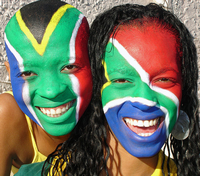The World Cup, which began on Friday, comes at a time when South Africa, regarded in some circles as a first-world country in a third-world continent, has been on a steady slide in all aspects of its national identity.Over and above all the sporting and cultural benefits that come with hosting the world's most-lucrative sporting event, South Africa hopes to use the accompanying high profile to mend its increasingly fractious politics, a deteriorating economy and a social system that is becoming more dysfunctional.
In its first decade after apartheid, South Africa rode high on a wave of international goodwill, thanks in large part to the personal appeal of its first democratic leader, Nelson Mandela. During that time, South Africa rebuilt its economy, which had been ruined by sabotage and international sanctions, while establishing the most-democratic political system in Africa and a social regime that compared favorably with most countries in the West.
However, Mandela's retirement in 1999 marked the beginning of a steady slide for the country's reputation, with every aspect of its once-wholesome fabric soon fraying.

